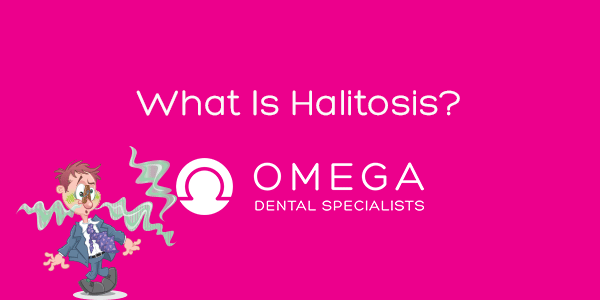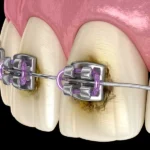What Is Halitosis?

Do you often find yourself popping a breath mint in your mouth when you’re around other people? If so, you might be worried about bad breath, also known as halitosis. It can affect your self-confidence and your relationships with friends and loved ones.
Table of Contents
What is Halitosis?
Halitosis is defined as a health condition that causes persistent bad breath. Roughly 30 percent of people worldwide are affected by halitosis. The source of halitosis originates from the mouth cavity including the mouth, throat, and tonsils. Bad breath is something that everyone goes through, but chronic halitosis can be diagnosed by a dentist if bad breath persists despite your attempts to improve brushing habits, flossing, and rinsing your mouth.
Others may not realize they have bad breath unless a friend or family member kindly let them know. According to the Massachusetts Dental Society, about 25% of people have a type of halitosis. The good news is that you can take some simple steps to fix this issue. If the cause is more serious, it’s important to see a doctor or dentist to take care of the problem.
The key to getting rid of halitosis is to find the source of the problem. Here are some frequently asked questions about bad breath and what you can do to get rid of it. We can change your dental experience forever.
What causes bad breath?
In about 9 out of 10 cases of halitosis, the mouth is the source of the odor. Here are some common reasons why a person has bad breath. The odor from bad breath is caused by sulfur-producing bacteria that breed and multiply underneath the tongue. Sometimes the breeding can take place in the throat and tonsils. The bacteria that is causing this phenomenon is anaerobic; meaning that the bacteria can live without oxygen. The bacteria do the job of breaking down proteins and amino acids. Proteins can come in the form of food, mucus, blood, or oral issue from diseases. After the bacteria consume the protein, its excretes waste called volatile sulfur compounds which are the origin of bad breath.
Dry mouth
caused by smoking, breathing through your mouth, or taking a certain medication. With less saliva in your mouth, bacteria don’t get rinsed out as much as normal, and this causes halitosis. If you can quit smoking, not only will you help to get rid of bad breath, but it will also make a big difference in your health. Dry mouth is commonly known as xerostomia in the medical world. A dry mouth is an ideal area for bad bacteria to hang out and reproduce. Day to day activities can cause dry mouth such as speaking for long periods of time, smoking, consuming alcohol, and snoring. The cause of bad breath due to daily activities can be compared to waking up with morning breath after a restful night’s sleep. When you sleep there is a lack of saliva production for several minutes. Individuals with a healthy mouth have normal saliva production at work. For instance, odors from food can be relieved just by the normal flow of saliva.
Food particles
like onion, garlic, or other food with a strong odor get stuck in your mouth or tongue. Brushing and flossing your teeth can help you to get rid of bad breath. Halitosis can be brought on when you eat certain foods such as onions and garlic including seasonings. These types of foods contain sulfur components. Foods in the categories of fish, dairy, and meat contain the type of proteins that oral bacteria feed off of. Refined foods and processed sugars also contain this type of bacteria. Drinks like coffee and juice can contribute to halitosis due to the acidity that allows the bacteria to live freely.
Poor Dental Hygiene
Maintaining oral hygiene is important when preventing plaque buildup on teeth and gums. Brushing your teeth to remove plaque causes any bacteria or microorganisms to be removed from your teeth. When you neglect dental hygiene, food particles and bacteria attach to your teeth and stay there for an extended period of time and turn into plaque. Plaque in its early stages can be removed with good brushing habits but when left for a prolonged period of time it can become difficult to remove. Sometimes plaque can harden near the gum-line. When the plaque hardens it damages teeth and gum tissues that can lead to dental gingivitis and periodontitis.
Dental issues
such as tooth decay or gum disease can result in bacteria getting trapped in pockets in the gums or cavities. Seeing a dentist is important for your health and getting rid of bad breath. If you still haven’t found the source of halitosis, in your case, and have ruled everything out illness may play a factor. Did you know that 10% of people who have halitosis have it because of an illness? Chronic halitosis can be provoked by having illnesses such as diabetes, lung or kidney disease, cancer, respiratory disorders. These illnesses cause halitosis because of the medicines and the illness’s effects on the body. Simple issues like sinusitis, pneumonia, bronchitis, postnasal drip, and other ailments that affect the head, chest, and throat area that may block airways can cause chronic halitosis.
Does having bad breath mean I have a health issue?
Some people have medical problems including conditions affecting the nasal passages, sinus, and throat that can cause bad breath. In some cases, halitosis may mean a person has a liver or kidney disease, diabetes, chronic bronchitis, or a respiratory tract infection. Other causes include postnasal drip and acid reflux. If you think a health issue is causing bad breath, see your doctor as soon as possible to get treated or determine if something else is causing halitosis.
Does what I eat cause bad breath?
Yes, food such as onion, garlic, coffee, and spicy food can affect your breath. When food is digested, your bloodstream absorbs it and as you exhale others can smell the food’s odor. Instead of eating chips and junk food, snack on apples, celery, or carrots to help clean debris in your mouth.
Can a dental problem give me bad breath?
Yes, bad breath can be a sign that you have an issue that needs a dentist’s treatment. Rather than using mints, make an appointment to see your dentist see if you have gum disease, a bad filling, cavity, or other problem. This includes tonsils with stuck food particles.
Experts recommend regular dental appointments and cleanings every six months to keep your teeth healthy and spot any potential problems before they require expensive procedures or treatments. You may want to keep track of the foods you eat and the medications you take and show the list to your dentist to help him or her figure out what’s causing bad breath. If your dentist concludes your bad breath is caused by an internal problem, he or she may recommend you see your primary care doctor or specialist for diagnosis and treatment.
How can I prevent bad breath?
Daily oral hygiene is essential to prevent halitosis. This includes:
- Flossing and brushing with fluoride toothpaste after each meal to get rid of bacteria that can cause odors. If you work or go to school, have an extra toothbrush so you can brush after lunch. You should get a new toothbrush every two to three months or after you get sick. Remember not to brush too hard since you can wear down your teeth and cause other problems.
- Using an electric toothbrush can help to better remove plaque, which is bacteria that can build up on your teeth and cause cavities and gum disease.
- Cleaning your tongue with a toothbrush or tongue scraper to get rid of bacteria that causes bad breath.
- Using an antiseptic or antibacterial mouth rinse to help prevent cavities and get rid of plaque. If you don’t have a mouth rinse available, rinsing with water can help to get rid of food particles in your mouth.
- If you have removable dentures, clean them thoroughly each night, so they’re ready to wear in the morning.
What else can I do to get rid of halitosis?
In addition to cleaning your teeth and gums as mentioned above, you can also:
- Drink lots of water since it helps to get rid of bacteria and debris in your teeth.
- Stop smoking or using tobacco products such as dip, snuff, and pipes. Tobacco users are more likely to develop gum disease and other health problems. Talk to your doctor if you need help such as nicotine patches or joining a program to quit smoking.
- Cut back on coffee since it has such a strong smell. If you crave a hot beverage, alternatives to coffee include green or herbal tea.
- Drink less alcohol since it causes dry mouth, and the odor can affect your breath for hours after drinking.
- Use sugarless gum after eating to improve your flow of saliva and improve your breath. However, you should avoid breath mints and gum with sugar since it doesn’t get rid of bacteria and can cause dental issues.
What Are Halitosis Symptoms?
Halitosis may affect your personal relationships and your everyday life. It is common to lose self-esteem when dealing with halitosis but how do you know you have halitosis and not bad breath? The main symptom of halitosis is dry mouth. Dry mouth can be caused by anything from daily activities to medications. Postnasal drip is the second most common symptom. Other symptoms include a white coating on the tongue, bitter or metallic taste in the mouth, thick saliva, burning sensations in the mouth, and dry eyes.
Getting Diagnosis:
Having trouble identifying the source? The best way to figure out the source of bad breath is to visit a dentist. Going to see a dentist can provide you with a professional diagnosis as well as provide you with treatment. To get the most out of your dental care, be honest with your dentists when questions may be asked. Being honest helps him or her to give you the proper diagnosis and treatment. Questions are also asked to find the source of the underlying cause. Your dentist will use a halimeter, a portable sulfide gas monitor that uses an electrochemical voltammetric sensor, to measure the amount of concentrated hydrogen sulfide in your mouth.
What Is the Treatment For Bad Breath?
The most common treatment for halitosis and bad breath that has been used for years is a specific mouthwash that contains alcohol. This may have adverse reactions because of the fact that alcohol is a drying agent that can cause dry mouth that can start the problem again. Alcohol does have great effects when it comes to dental health. The components in alcohol are very powerful and can tame a good number of ailments. Other treatment options are certain mouthwashes and toothpaste that have chlorine dioxide or sodium chlorite. These chemicals are meant to neutralize sulfur compounds in your mouth and help to reduce odor-causing bacteria. If the dentist decides that the dry mouth is the cause of your halitosis your treatment might include a saliva alternative to moisten your mouth. This alternative lasts all day and has natural ingredients like Aloe Vera, green tea, and tea tree oil. Keep in mind that when visiting a dentist, they can help you get rid of harmful bacteria that cause halitosis. What a dentist is unable to eliminate is the bacteria on the tongue. What you can do to treat this issue is to brush or scrape your tongue every time you brush your teeth.
If you are concerned you might have halitosis or would like to treat any dental ailments visit Omega Dental Specialist if you are in the Houston, Texas area.
What is the traveler’s breath?
If you fly a lot, your salivary glands often produce less saliva. As a result, bacteria grows in your mouth and causes bad breath. Also, your diet may change since you’re eating out a lot and you may neglect your dental hygiene.





